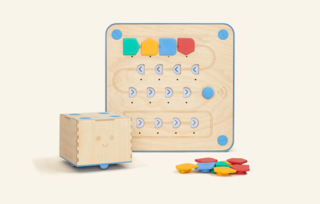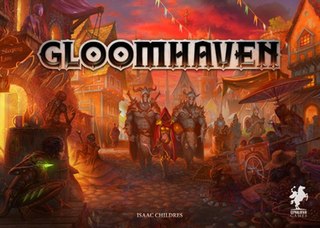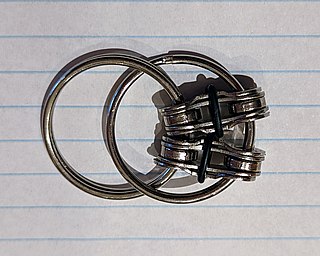
The National Toy Hall of Fame is a U.S. hall of fame that recognizes the contributions of toys and games that have sustained their popularity for many years. Criteria for induction include: icon status ; longevity ; discovery ; and innovation. Established in 1998 under the direction of Ed Sobey, it was originally housed at A. C. Gilbert's Discovery Village in Salem, Oregon, United States, but was moved to the Strong National Museum of Play in Rochester, New York, in 2002 after it outgrew its original home.

A stress ball or hand exercise ball is a malleable toy, usually not more than 7 centimetres (2.8 in) in diameter. It is squeezed in the hand and manipulated by the fingers, ostensibly to relieve stress and muscle tension or to exercise the muscles of the hand.

Self-stimulatory behavior, also known as "stimming" and self-stimulation, is the repetition of physical movements, sounds, words, moving objects, or other behaviors. Stimming is a type of restricted and repetitive behavior (RRB). Such behaviors are found to some degree in all people, but is especially intense and frequent in those with developmental disabilities, attention deficit hyperactivity disorder (ADHD) or autism. People diagnosed with sensory processing disorder are also known to potentially exhibit more stimming behaviors.

Mark McLachlan is a product and game designer. Mark has designed and released products under the scope of the product design and game publishing studio Antsy Labs. In collaboration with his brother, Matthew McLachlan, Mark invented the Fidget Cube, the second most-backed Kickstarter campaign in history.

Fidgeting is the act of moving about restlessly in a way that is not essential to ongoing tasks or events. Fidgeting may involve playing with one's fingers, hair, or personal objects. In this sense, it may be considered twiddling or fiddling. Fidgeting is commonly used as a label for unexplained or subconscious activities and postural movements that people perform while seated or standing idle.

Jessica Lauren McCabe is an American actress, writer, and YouTube personality. She is best known as the host for the YouTube channel How to ADHD as well as for roles in several independent films and television shows including the show American Dreams and the short film Lure.

Kickstarter, PBC is an American public benefit corporation based in Brooklyn, New York, that maintains a global crowdfunding platform focused on creativity. The company's stated mission is to "help bring creative projects to life". As of February 2023, Kickstarter has received US$7 billion in pledges from 21.7 million backers to fund 233,626 projects, such as films, music, stage shows, comics, journalism, video games, board games, technology, publishing, and food-related projects.
Brandon Laatsch is an American game developer, filmmaker, and YouTuber known for directing Video Game High School, founding the game company Stress Level Zero, and other online video content.
The video game developer and publisher Nintendo has engaged in a variety of marketing campaigns, ranging from early efforts to appeal to teenagers with "Play It Loud!" to the more open-ended "Who Are You?" campaign. Nintendo also sometimes markets its various consoles and games with lavish promotions.
Video game development has typically been funded by large publishing companies or are alternatively paid for mostly by the developers themselves as independent titles. Other funding may come from government incentives or from private funding.
Level-5 Comcept, formerly known as Comcept Inc., is a Japanese video game developer company. Based in Osaka, it was founded by former Capcom designer Keiji Inafune on December 1, 2010. The company was acquired by Level-5 in 2017. Their projects include Soul Sacrifice, Mighty No. 9, ReCore and Red Ash: The Indelible Legend. In addition to games on handheld and home consoles, the studio has developed multiple mobile games.

A virtual reality headset is a head-mounted device that uses 3D near-eye displays and positional tracking to provide a virtual reality environment for the user. VR headsets are widely used with VR video games, but they are also used in other applications, including simulators and trainers. VR headsets typically include a stereoscopic display, stereo sound, and sensors like accelerometers and gyroscopes for tracking the pose of the user's head to match the orientation of the virtual camera with the user's eye positions in the real world. Augmented reality (AR) headsets are VR headsets that enable the user to see and interact with the outside world. Examples of AR headsets include the Apple Vision Pro and Meta Quest 3.

Primo Toys is a London-based educational toy company founded by Filippo Yacob and Matteo Loglio, best known for creating the Cubetto Playset, an award-winning wooden robot that has been used by more than 10 million children to date, designed to teach children how to code using a tangible programming language that doesn't use screens or literacy. In April 2016, Cubetto became the most crowd-funded ed-tech invention in history, when 6,553 backers pledged a total of $1,596,457 to support their Kickstarter campaign. Primo Toys are backed by Randi Zuckerberg, Arduino co-founder Massimo Banzi, and Liam Casey's PCH International.

A fidget spinner or hand spinner is a toy that consists of a ball bearing in the center of a multi-lobed flat structure made from metal or plastic with metal weights in the lobes, designed to spin around its central axis. Fidget spinners became very prevalent trending toys in 2017.

A squishy is a type of soft toy made of a specially formulated soft polyurethane foam, that slowly returns to its original shape after being squeezed. Squishies are manufactured into many different shapes and sizes, such as animals, fruits, and food items. They are often scented to match the object represented. The toy is also called kawaii squishy, kawaii meaning "cute" in Japanese.

Gloomhaven is a cooperative board game for one to four players designed by Isaac Childres and published by Cephalofair Games in 2017. It is a campaign-based dungeon crawl game including a narrative campaign, 95 unique playable scenarios, and 17 playable classes. Since its introduction the game has been acclaimed by reviewers, and has been described as one of the best board games ever made.
Return to Dark Tower is a board game for one to four players, designed and published by Restoration Games. The game is a sequel to the 1981 board game Dark Tower, by Milton Bradley Company. Return to Dark Tower has players cooperate or compete as they rule over kingdoms surrounding the titular Tower, with their chosen "heroes" gathering resources, defeating monsters and enhancing their strength. As the game progresses, the Tower dispenses corruption across the land, which players must cleanse, while also looking to identify the foe inhabiting the Tower, so that they may defeat it, to win the game. Return to Dark Tower features a circular mat that is sectioned into quarters, to represent the kingdoms, with a Bluetooth-powered Tower at the center, which is connected to an app that runs the game.
Critical Role, an American web series in which a group of professional voice actors play Dungeons & Dragons, has spawned many related products, including books, comics and an animated series, which are produced by Critical Role Productions. Various third-party, licensed works have also been released since Critical Role began in 2015.

A fidget toy or fidget is typically a small object used for pleasant activity with the hands. Some users believe these toys help them tolerate anxiety, frustration, agitation, boredom, and excitement. They are also commonly used by those with sensory difficulties. Fidget toys have uses in both therapeutic and educational settings, although some controversies about their safety and effectiveness have been brought up over the years.













